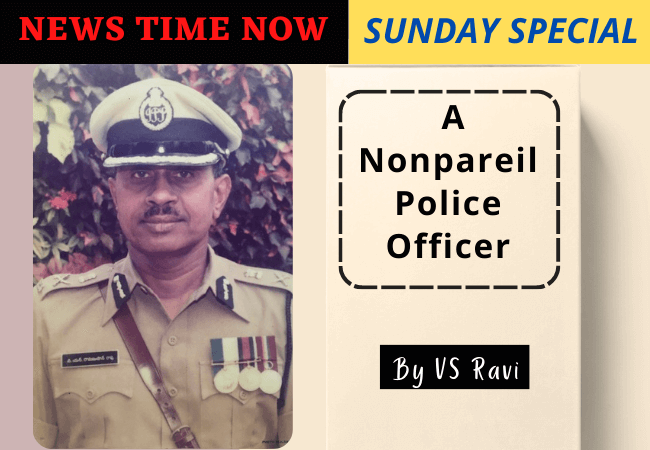P.S. Ramamohan Rao’s “MEMOIR” is packed with facts relating to his brilliant academic record and his distinguished career as a Police Officer. I would unhesitatingly say that he had achieved much more in one lifetime than what most police officers would in three lifetimes.
After a brilliant academic record in school at Vijayawada and Presidency college in Chennai, he cleared the competitive examination with a top rank in the Indian Police Service in 1956. Even as an Assistant superintendent of police (of two subdivisions) and as Superintendent of police of Mahboobnagar he revealed his high sense of duty and capacity for hard work. He effectively maintained law and order and carried out investigation of several sensational cases with great skill and thoroughness.
The IB, having assessed his potential quite early, took him on deputation under the earmarking scheme.
By assiduously cultivating captains of Industry and trade union leaders, while at Jamshedpur, he revealed his special flair for gathering intelligence, in the very beginning of his long association with the IB. His command over the English language enabled him to write reports which were appreciated by all the senior officers of the IB, including B.N. Mullik. It is as an Intelligence officer at the Headquarters in Delhi as well as in Hyderabad (as Central Intelligence officer) and as Head of the State Intelligence (Andhra Pradesh) that Rao made his mark and displayed his prowess. His timely reportage and assessments of the two separatist agitations in the then united Andhra Pradesh greatly helped the Central Government in finding solutions. More, he earned the acknowledgement of the Prime Minister herself for his efforts.
His transformational leadership of the A P State Road Transport Corporation for over five years retrieved it from the brink of collapse and made it a role model in the Country, apart from winning laurel after laurel for a number of years even after he left the helm.
Ramamohan Rao became the youngest DGP of the united Andhra Pradesh at the age of 52 years. He initiated a whole set of reforms to improve the professional competence of the Police Force and modernise it. Notable among them were the processes of recruitment of police personnel at the cutting edge and the creation of a crack force ‘Grey Hounds’ for tackling the Naxalite menance which loomed large not only in A P but also in the entire Gondwana belt of the Country. Both these reforms became templates for the Country. The State Police Academy which now rivals the National Police Academy was also his initiative.
However, two incidents diminished the shine on his tenure as Police Chief.
On the night of 27/28 December 1987, seven IAS officers and a State Revenue officer were abducted by Naxalites, in the Agency area as hostages for the release of some of their top leaders. Much against the professional judgement and advice of Rao, the State Government chose to meet the demand of the Naxalites. Just before that the entire Central Committee of Naxals managed to escape the dragnet of A P Police in Davana Giri of Karnataka State. This twin setback rightly made Rao lament that “what could have been a historical success, with the entire leadership of the PWG in jail, turned out to be a humiliating surrender by the Government, all because of the utterly irresponsible conduct of a few IAS Officers”.
The second issue was the endemic caste war in Vijayawada between the Kapus and the Kammas. Here again the professional advice of Rao was given short shrift by the Government. The large scale violence and destruction of Kamma property by the Kapus in the wake of the murder of the Kapu leader Mohan Ranga, planned and executed by the Kamma faction was blamed on the Police. In fact the murder could be blamed on intelligence failure of the Police, but not the handling of the aftermath. Despite egregious failure of some field police officers even at a senior level, the firm direction provided by Rao personally in handling the situation which resulted in 29 deaths in police firings in just one day brought the situation under control. Yet owing moral responsibility, Rao stepped out of the post of Police Chief, a rare example of conscience.
After retirement he was chosen to hold the high office of Governor of Tamil Nadu, by an unprecedented consensus among all the political stakeholders. Despite a tough environment marked by implacable hostility between the ruling A I D M K, led by a combative Chief Minister, Jayalalitha and the opposition D M K, led by a seasoned and astute politician, M Karunanidhi, Rao handled his office with a finesse and grace which earned widespread popular appreciation and acceptance.
Constraints of space would permit me to narrate only a few of his achievements
- In the very beginning of his tenure as Governor he introduced gubernatorial informality by dispensing with a number of colonial traditions and practices, anachronistic in a democratic Country.
- He persuaded a difficult Chief Minister to give him the freedom and latitude to edit the Governor’s addresses to the Legislative Assembly.
- He mediated the choice of Abdul Kalam as President.
- He persuaded the State Government to substantially ameliorate the service and economic conditions of a huge workforce of manual scavengers in the State thereby earning their eternal gratitude.
- He streamlined the procedure of appointment of vice-chancellors.
- He spearheaded the renovation of two heritage buildings i.e. the Raj Bhavan in Chennai and the Madras University senate House. Incidentally, he had the unique distinction of becoming the chancellor of the very University from which he obtained his degrees.
- He lowered the drawbridge to the Government House in many ways and made it accessible to the public. Interactions with school children were a special feature
- He facilitated the installation of the statue of Sardar Patel on the thoroughfare in front of the Raj Bhavan which was already named after him.
Thus he was a “public friendly” Governor to use a phrase from computer terminology.
Police officers are conventionally divided into four categories. Thus some officers are considered good at investigation of crime. Some officers acquire a reputation for being good at maintenance of Law and Order. Some officers display skills in collection and analysis of Intelligence. Some are good administrators. To my mind, Ramamohan Rao is one of the very few officers in the entire Indian Police service in whom all the four qualities were combined harmoniously.
He was free from prejudices, or preconceived notions. He did not have any caste bias Throughout his Service even when he had to investigate cases in which one party happened to be from his own caste he acted on merits. He was generous in paying tributes to a colleague, senior or junior. Ramamohan Rao is known for his gift of the gab, his Ciceronian eloquence, and his incisive analysis of any issue under consideration.
Many people would not be aware that though Rammohan Rao exuded optimism and confidence he bore silently the pain of having a differently abled son and never allowed it to affect his morale; cloud his attitudes or detract from his duties.
Today Rammohan Rao is a distinguished elder of the Indian Police Service.At an age when most officers hardly leave their residence, he actively participates in the informal lunch held every month by retired officers. He is the life of the party and the anecdotes he narrates, are listened to with rapt attention by all junior colleagues. His Memoir which tells the story of his life and glorious career is worthy of serious reading by one and all. Particularly, young officers in Police and other disciplines will have a lot to learn and ponder from his experiences.


















































